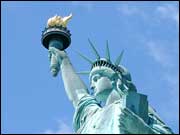A nation of immigrants
I couldn't help but connect the plight of these migrants to my own family history.
I couldn’t help but connect the plight of these migrants to my own family history. My father had died the year before, and for Saint Patrick’s Day 2000 I wrote a lengthy piece for the Weekly on his life and family. His Irish grandparents, Timothy O’Regan and Mary Comey, had fled rural Ireland for Philadelphia in 1872. They made an arduous voyage across the Atlantic, only to watch two of their small children die, before dying themselves, in extreme poverty, in a strange city, at the ages of 36 and 34. My orphaned grandfather, Jeremiah T. Regan, was left to raise himself on the streets.
I had immersed myself in this Irish immigration history just months before I drove down to Douglas. So when I met the Guatemalan man whose young cousin, Silverio, had just died in his arms, I thought of my great-grandparents’ deaths in a foreign land. When I glimpsed a lone migrant purposefully trekking north through the desert, I was reminded of their determination. And when I saw brown-skinned women and children behind bars, I remembered the discrimination the Irish and other earlier immigrants suffered when they arrived in America. The stories of these new dispossessed foreigners may have been different in the details from my great-grandparents’, but they were the same in all the ways that matter.
Like my forebears, these Mexicans and Central Americans had given up their homes to go where the work was. They were doing whatever they could to keep their children alive. We sometimes forget that the American immigration saga, cheerfully celebrated every Thanksgiving, does not always have a happy ending for those who risk everything to cross the sea or desert, though it may have for their descendants. My great-grandparents’ journey ultimately was as much a failure as Josseline’s and Silverio’s, but it had a saving grace. They had two children who survived them, and their own suffering gave way to a better life for their children’s children and beyond.
© 2010 Margaret Regan. Excerpted with permission from The Death of Josseline: Immigration Stories from the Arizona Borderlands, by Margaret Regan (Beacon, 2010). A Common Read project invites participants to read and discuss the same book in a given period of time. Learn more about the UUA’s suggested 2010-11 Common Read, Regan’s The Death of Josseline. See sidebar for links to related resources.
Comments powered by Disqus







